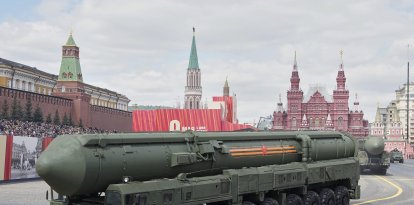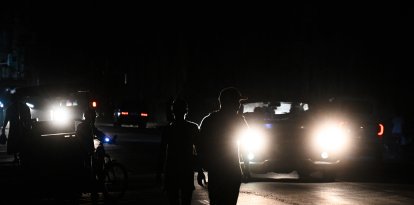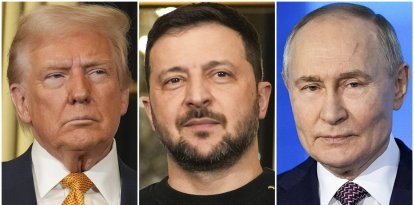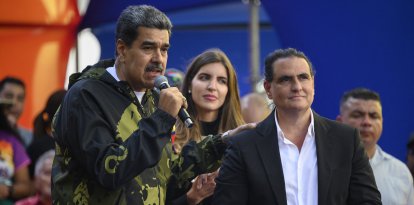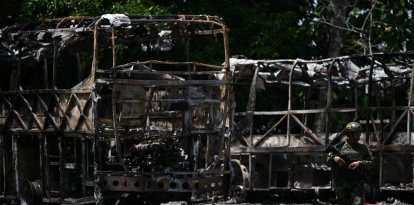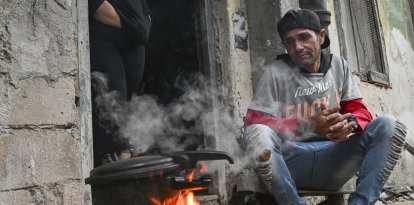'Operation Knock Knock': The Nicolás Maduro regime’s fear tactic of going door to door kidnapping dissidents
With scary music playing in the background, the dictatorship shares videos of the kidnappings of opponents and dissidents.

Diosdado Cabello, one of the most influential men within the Chavista regime and creator of the dreaded “Operation Knock Knock.” (Photo by Federico PARRA / AFP)
On the official Instagram account of the Venezuelan General Directorate of Military Counterintelligence (DGCIM), videos are piling up. With background music straight out of a horror movie like “Nightmare on Elm Street,” officials share videos of the captures and arrests of opposition leaders. This is “Operation Knock Knock” (“Operación Tun Tun” in Spanish).
It debuted in 2017, when, on his TV program, Diosdado Cabello, one of the most important figures in the Chavista regime, asked the dictatorship's agents to detain every opposition leader and citizen, in their homes. But these last two weeks, after the regime committed monumental fraud in the July 28 presidential election, the repression and persecution has intensified.
"They knew they were coming for him, but not when. In the end no one is safe. We had been sleepless nights until the door finally rang," says María González, whose name was altered for security reasons, the mother of a political prisoner kidnapped on Aug. 3.
"They were hooded. It was after 9 o'clock at night. First they knocked normally on the door, then they were more aggressive. Then they threatened directly: that if we didn't open the door, they were going to break it down," she adds.
The young man was arrested for having gone to an opposition demonstration. A Chavista neighbor had called the DGCIM, after the repressive body shared an image on social media encouraging its followers to report dissidents.

Capture from Instagram of the DGCIM.
For several hours, his mother did not know where he was. Finally she found out: he was accused of terrorism in an express trial and sentenced to eight years in prison. Today he is in Yare prison, in the state of Miranda, an hour south of Caracas.
According to the organization Foro Penal, since July 29, right after the electoral fraud, through Aug. 9, the Nicolás Maduro regime has illegally detained some 1,263 people, of which 114 are minors and 16 are disabled.
One of these detentions was that of María Oropeza, regional leader of María Corina Machado's party, Vente Venezuela. Her kidnapping had an important impact because Oropeza streamed the whole episode live on her Instagram account: several agents of the DGCIM arrived at her house, located in the state of Portuguesa. They demanded that she open the door and she refused, asking for a search warrant. They had no warrant. Finally they forced their way in and took her away. The next day, with horror movie music, the DGCIM circulated the video.
">#ÚLTIMAHORA | María Corina Machado, líder de la oposición venezolana alertó que agentes del régimen de Nicolás Maduro, secuestraron a la coordinadora de Vente Venezuela en Portuguesa, María Oropeza, quien logró transmitir en vivo por Instagram cómo irrumpieron en su casa pic.twitter.com/LysCPDaeey
— Azucena Uresti (@azucenau) August 7, 2024
A few hours before her kidnapping, María Oropeza had criticized “Operation Knock Knock” on social media.
">La “operación Tun Tun” es persecución política contra los venezolanos que defienden la VERDAD, y la verdad es que @EdmundoGU es el Presidente Electo de Venezuela, elegido por una inmensa mayoría el pasado 28 de julio.
— María Oropeza (@mariaoropeza94) August 6, 2024
Seguimos luchando hasta el final junto @MariaCorinaYA 🇻🇪 pic.twitter.com/3eU9mZzsd0
"The Chavista regime sees itself as an occupying force, not a political force. That is why they use war propaganda with the intention of terrorizing the population and Venezuelan dissidents. They have no speech or people left, they only have fear," said political scientist and analyst Daniel Chang.
">In truly totalitarian fashion, the Maduro regime is publishing war propaganda video to terrorize the Venezuelan people.
— Daniel Chang Contreras (@DanielEChangC) August 8, 2024
They usually go like this:
-A video of a regular citizen/political activist criticizing the regime.
-Montage of security forces imprisoning dissidents.… pic.twitter.com/JUDmtZwXSy
From his Instagram account, Diosdado Cabello himself has shared videos of “Operation Knock Knock.” On Aug. 3, he shared one in which, with images from the horror movie “Saw,” he shows how the regime arrested a TikTok creator who had previously posted a video challenging him on social media.
At a political rally, Nicolás Maduro himself mocked the detained protesters and echoed the tactic of intimidation and repression. In front of dozens of supporters, he said: "Knock knock! Don't be a crybaby, you're going to Tocorón!" referring to one of the prisons to which hundreds of opposition protesters have been sent.
Other well-known leaders who have been kidnapped under “Operation Knock Knock” are Freddy Superlano, leader of the Voluntad Popular party, and Williams Dávila, of Acción Democrática. Reports from family members and fellow party members suggest that Superlano has been subjected to severe torture, allegedly to frame María Corina Machado.
Although the repression has been unprecedented, as Foro Penal emphasized, Venezuelans remain in the streets demonstrating against the fraud committed by Nicolás Maduro. Opposition leader, María Corina Machado, said on Aug. 9 in an interview with influencer Lele Pons that she will soon announce new massive demonstrations throughout the country.













